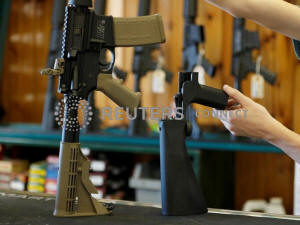|
U.S. Supreme Court rebuffs bid to block
Trump's gun 'bump stock' ban
 Send a link to a friend
Send a link to a friend
 [March 29, 2019]
By Lawrence Hurley [March 29, 2019]
By Lawrence Hurley
WASHINGTON (Reuters) - The U.S. Supreme
Court on Thursday handed President Donald Trump a victory by rejecting
for the second time in three days a bid by gun rights activists to block
his new ban on "bump stock" attachments that enable semi-automatic
weapons to fire rapidly.
The policy, embraced by Trump in the wake of an October 2017 massacre in
Las Vegas in which bump stocks were used, went into effect on Tuesday.
The ban is a rare recent instance of gun control at the federal level in
a country that has experienced a succession of mass shootings.
The court in a brief order refused to grant a temporary stay sought by
the group Gun Owners of America and others in a lawsuit filed in
Michigan challenging the ban while litigation continues. Chief Justice
John Roberts on Tuesday rejected a similar bid to block the policy in a
separate legal challenge brought in Washington by individual gun owners
and gun rights groups including the Firearms Policy Foundation and
Florida Carry Inc.

Michael Hammond, Gun Owners of America's legislative counsel, said many
owners of the estimated 500,000 bump stocks in the United States would
refuse to turn them in despite the ban and related criminal penalties.
People caught in possession of bump stocks could face up to 10 years in
prison under the policy.
"GOA will continue to fight the issue in the court system, as the case
now returns to the lower courts. We remain convinced that the courts
will consign this unlawful, unconstitutional ban to the trash bin of
history, where it belongs," Hammond said in a statement, using the
group's acronym.
A Justice Department spokeswoman said the administration was pleased
with the high court's action.
Bump stocks use a gun's recoil to bump its trigger, enabling a
semiautomatic weapon to fire hundreds of rounds per minute, which can
transform it into a machine gun. The Justice Department's regulation
followed the lead of many states and retailers that imposed stricter
limits on sales of guns and accessories after a deadly shooting at a
Florida high school in February 2018.
LAS VEGAS SHOOTING
Trump pledged to ban bump stocks soon after a gunman used them in a
spree that killed 58 people at a country music festival in Las Vegas.
The Justice Department on Dec. 18 announced plans to implement the
policy on March 26.
[to top of second column]
|

A bump fire stock, (R), that attaches to a semi-automatic rifle to
increase the firing rate is seen at Good Guys Gun Shop in Orem,
Utah, U.S., October 4, 2017. REUTERS/George Frey/File Photo

The FBI said in January it had found no clear motive for the
64-year-old Las Vegas gunman, Stephen Paddock, in the deadliest mass
shooting in modern U.S. history.
In the Michigan case, a federal judge already has ruled in favor of
the administration. The Cincinnati, Ohio-based 6th U.S. Circuit
Court of Appeals refused to put the ban on hold pending appeal.
Other plaintiffs in that case include the Gun Owners Foundation, the
Virginia Citizens Defense League and three individual gun owners.
In the Washington case, a federal judge also upheld the ban,
prompting the gun rights advocates to appeal to the U.S. Court of
Appeals for the District of Columbia Circuit. That court has heard
oral arguments but has not yet ruled.
Those challenging the policy have argued that the U.S. Bureau of
Alcohol, Tobacco, Firearms and Explosives (ATF) lacks the authority
to equate bump stocks with machine guns. One of the laws at the
center of the legal dispute was written more than 80 years ago, when
Congress restricted access to machine guns during the heyday of
American gangsters' use of "tommy guns."
Trump's fellow Republicans typically oppose gun control measures and
favor of a broad interpretation of the right to bear arms promised
in the U.S. Constitution's Second Amendment. In 2017, there were
39,773 gun deaths in the United States, according to the most recent
U.S. Centers for Disease Control and Prevention figures released in
December.
(Reporting by Lawrence Hurley; Editing by Will Dunham)
[© 2019 Thomson Reuters. All rights
reserved.]
Copyright 2019 Reuters. All rights reserved. This material may not be published,
broadcast, rewritten or redistributed.
Thompson Reuters is solely responsible for this content.
 |